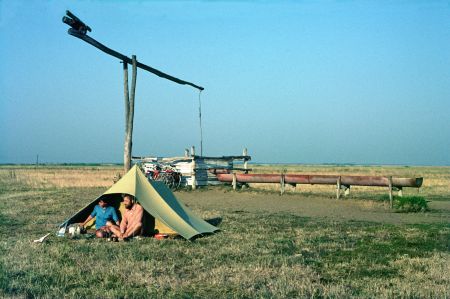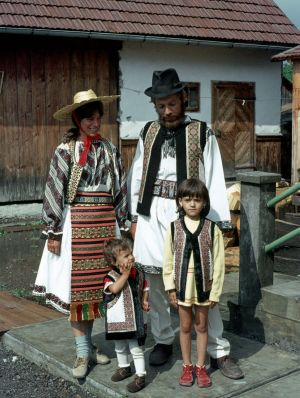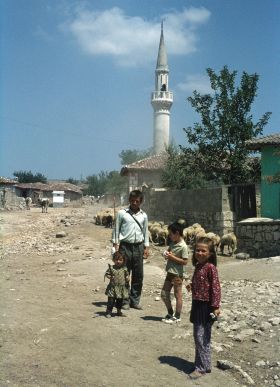| Barelds - Cycling around the world - Cycle stories - Asia, Africa, Europe, America | ||||||||||||||||||||
| home | site map | world | children | recent | cooking | dutch | german | react | ||||||||||||
Eastern Europe, Near East and Northern Africa (2).

Hungary: Free camping at a puszta well full of frogs.
W
ith our flashlights we shone the pitch-dark road. There was no street lighting. We looked for a camping place.In Hungary we ate every day, a full meal in a restaurant, in the evening, before we put up the tent. The mandatory money exchange - it is true it is lower for campers -, forced us to eating our many forints, because we mostly camped without paying anything. Gulyás, pörkölt, palacsinta, you name it, absolutely delicious. In addition, music to your ears the impassioned strumming and fiddling of a gypsy orchestra which shackled us to our chairs. A few party officials were the only dissonances. It was nearly dark when we were outside and wanted to mount our bicycles. A drunk Russian stopped us. "Brother" he said, pressing Henny to massive chest, "let me admire your bicycle."
Outside the village there were neither farms nor wells, only after a long search with the flashlight, we found a house around which there was space. With a dictionary in our hands we knocked on the door: "Could we put up our tent here?" we showed them our question. The answer was not looked for in the book, but a flashlight was fetched en we could, well lit, quickly put up the tent.

Romania: Unbelievably friendly people who were enormously proud of their costumes.
As it happened already so often in the East block, our tent stood on a godly place, by a clear brook and surrounded by pine trees. All of a sudden two policemen pop up. "Passports" they ask and take our black booklets. Couldn't you just camp freely? Half an hour later they come back; with the passports and the mayor. "Why don't you come and sleep in my house," he asks.
No, when you cannot camp quietly and freely in Rumania, this is because the people constantly invite you in this unbelievably hospitable country. "Throw away that muck," the farmer said on whose private meadow we stood, pointing at the factory cheese. "Come in." His wife stood at the tiled stove, a tiled large thing that occupied half of the kitchen. She was stirring a steaming mamaliga - corn porridge - and scooped plates full of homemade white cheese. You could cycle on it very well.
"Come in and eat with me," the woman signified and coaxed us proudly away from a restaurant "what they serve there is not up to much". At home she went into the kitchen, her husband poured a glass of home-made prune gin; we didn't cycle very much thereafter. The TV was switched on, all production figures. "Communism" our landlord said, shaking his head, "is good for the Russians, they are too lazy to work, but not for us."

Turkey: The very backward Tracie in European Turkey.
When the imam at dawn blared his call to prayer to the sleeping Turks, we were already on our bicycles. In the mean time the summer had come and it became scorching in the daytime. We cycled as close as possible to the Mediterranean coast to dive into it or to camp near it.
Before Bursa we had to go inland. It was midday and the road before of us was dancing in the heat waves and began to go up rather steeply, through a ravine in bare rocky mountains The sun was in its zenith and it seemed as if he it was pouring buckets full of scorching photons on us. As the kilometres advanced so did the temperature in our bodies, in seemed that our blood reached the boiling point and tried to burst out via our heads. The old dilapidated Turkish cars climbed also arduously upwards, with coughing smoker's lungs and blew hot smoke on us ,which made literally and figuratively that everything went black for our eyes.
The natural cooling on a bicycle: wind which evaporates the sweat, failed completely. The speed of the climb was too low to make an airstream and in the ravine the air seemed to stand still. Neither steepness, nor length, and neither the bad road surface made this climb to a torment, but purely and solely the fact that the body could not get rid of the heat.
At Troje we saw the last glimpse of Europe, at the other side of the Dardanelles. Like ships we approached many other antique cities, once thriving harbours now kilometres away from the sea in silted up, coastal planes. Fascinating and totally different and with ruins often in a good condition.
"Look" the guard pointed out, while he walked with us on the paved street in Elefsis, "here were the public toilets with flush!" "Yes" Henny nodded, " but you haven't learned much from the Greek, because this, you Turks, don't have now", thinking of the toilets as we found them in our hotels: the smell indicated the direction you had to go, 'a hole in the ground' type and in the corner a stick to cram the deposited into the hole. Often in the dusk it was important to make sure what the under side or the upside of the stick was.
| Start World around | Europe - North Africa | << Previous | Next page >> | |||
| Barelds on bicycle through the world - Cycling in Asia, Europe, Africa, America | ||||||